Nature’s Scents and Our Health: How Scientists Are Studying the Impact of Natural Smells on Well-Being
In recent years, scientific research has increasingly focused on the impact of the environment on human health, and one of the most intriguing aspects of this study is the role of natural scents. Scientists have begun to explore how the scents of forests, the sea, and other natural landscapes can impact our physical and emotional well-being. These studies aim to uncover how natural scents can reduce stress, improve mood, and even have a positive impact on overall health. Understanding these interactions can open up new perspectives for creating wellness practices and improving quality of life through mindful interaction with nature.
Green Window to Recovery: How Nature Views Speed Up Healing in Healthcare Facilities
A study has demonstrated the surprising effect nature has on the healing process of hospital patients. In the experiment, scientists compared the treatment results of two groups of patients who were in similar conditions, but with one difference: one group had the opportunity to see greenery and open spaces from their rooms, while the other group had a view of brick walls or empty courtyards.
The results of the study showed that patients whose windows overlooked nature recovered significantly faster. They demonstrated lower levels of stress and pain, and required fewer medications to relieve symptoms. Surprisingly, even short-term contact with the natural landscape contributed to a faster recovery and improved overall well-being.

This experiment highlighted the importance of visual and psychological interaction with nature for human well-being. It became the basis for further research aimed at integrating natural elements into medical institutions and creating more comfortable conditions for patients, which opened up new horizons in the approach to treatment and rehabilitation.
Nature’s Scent as Medicine: New Research Reveals Potential of Olfaction to Improve Quality of Life
Understanding how natural scents affect our health could not only improve our well-being, but also influence how we care for our planet, protect ecosystems, and design urban spaces, homes, and parks. While traditional research has focused primarily on the visual aspects of interacting with nature, such as enjoying green landscapes, much less attention has been paid to the role of the sense of smell. A group of researchers aims to change this approach by focusing on how the scents of nature affect our physical and emotional well-being. This new area of research could pave the way for a deeper understanding of how scents can contribute to our health and well-being, as well as influence the future design of living spaces and conservation.
“Our environment is saturated with scents, and we have a sophisticated olfactory system that detects and interprets them, which in turn influences our mood and behavior,” explains Gregory Bratman, an associate professor of ecology and forestry at the University of Washington. “Yet, in contrast to the extensive research on the visual perception of nature, we know much less about how nature’s scents and olfactory cues affect us.”

Gregory Bratman points out that while the visual and emotional effects of nature are being studied extensively, the sense of smell remains less explored. “Smells play a key role in shaping our perception of the world around us and can have a significant impact on our psycho-emotional state,” he adds. Research shows that olfactory signals can trigger various emotional responses and even change cognitive processes.
Modern research is beginning to focus on the importance of olfactory perception, viewing it as a powerful tool in improving quality of life and well-being. For example, the smells of forests, fresh grass, or sea air can have a calming and restorative effect. This knowledge can be used to create more harmonious and supportive spaces in healthcare settings, urban areas, and residential areas.
As scientists continue to delve deeper into the study of olfactory perception, we are beginning to realize how important it is to incorporate the scents of nature into solutions aimed at improving overall well-being and creating healthier, more comfortable living conditions.
Gregory Bratman and his international colleagues are joining forces to study how odors and aromas from natural environments affect our health and well-being. This interdisciplinary team of specialists, including experts in olfaction, psychology, ecology, public health, atmospheric sciences and other fields, works in scientific institutions around the world, from the US and UK to Taiwan, Germany, Poland and Cyprus.


